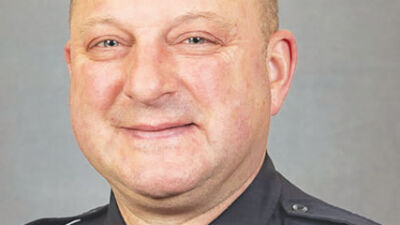
West Bloomfield Fire Department Capt. and EMS Coordinator Gary Proctor recently spoke about his recovery process after having “four little strokes” in November.
Photo provided by Jeff Adkins
WEST BLOOMFIELD — For over 20 years, West Bloomfield Fire Department Capt. and EMS Coordinator Gary Proctor has assisted local residents during medical emergencies.
However, in November, Proctor found himself being escorted to Henry Ford West Bloomfield Hospital by crew members of the West Bloomfield Fire Department.
Proctor recalled that, shortly after arriving for a shift, he noticed that he had numbness in one of his legs.
At first, Proctor attributed the numbness to an old back problem, and he began walking around to “loosen it up.”
Aside from that not helping fix the problem, he also noticed that he had a “funny” ringing in his ear.
All that was enough to prompt Proctor to ask one of his coworkers to take his blood pressure.
After doing so, his coworker said, “You need to go in,” to the hospital.
Proctor recalled that his blood pressure was over 200 systolic. The American Heart Association says over 180 is considered a crisis.
He consented to go to Henry Ford West Bloomfield Hospital, figuring, “I’ll just have the crew run me over there real quick, and I’ll be back shortly.”
As it turned out, Proctor’s hospital stay lasted five days, and he didn’t return to work for around three weeks.
After having a CT scan taken, he said he was informed that he had suffered “four little strokes.”
After being released from the hospital, Proctor went through approximately two months of rehabilitation.
He was also informed that he needed a lifestyle change.
“I was using a cane, and walking the length of the house was a chore,” he said. “And of course, along with everything else, they’re like, ‘Yeah, you got to lose weight, get your life together, start living a little more healthy,’ and all that fun stuff. But when you see people have strokes, they always have some sort of deficit. I got very lucky; I had very minor deficit on one side. Most of that strength came back within a month or so.”
The outcome for other stroke victims has been very different.
“Stroke is one of the leading causes of disability and even death in the United States,” said Hebah Hefzy, who is the medical director of the stroke program at Henry Ford West Bloomfield Hospital. “Many people survive stroke, but in certain cases, when the stroke is very large, it can be fatal.”
Paralysis, permanent communication difficulty and an inability to see properly are some of the aftereffects that can occur as a result of a stroke, according to Hefzy.
Proctor shared the primary issues he was dealing with after his strokes.
“Mostly it was having to get the blood pressure under control and my diet under control,” he said. “But most of the physical issues were left-sided weakness and trying to get that left foot, I guess for lack of better description, to behave itself, because it wanted to drop and drag a lot — that kind of stuff.”
Hefzy discussed some of the symptoms that should prompt people to call 911.
“The sudden onset of any (neurological) problem that wasn’t there, whether it’s sudden onset of vision change; weakness; numbness; tingling; a sudden, severe headache; sudden dizziness,” she said. “The key here is that strokes happen all of a sudden, so when symptoms come on all of a sudden, that should be a red flag.”
Weakness on one side of the body, a change in speech, and when someone’s balance is off are some of the specific symptoms Hefzy believes people should be on the lookout for.
Although strokes are more common in men and Black and Hispanic people, Hefzy said, “It can really affect anybody,” and at any age.
She shared the importance of seeking immediate medical attention if someone is experiencing stroke symptoms.
“It’s very important, because there are medications and treatments we can use and give that reverse the stroke,” Hefzy said. “(They’re) most effective when used immediately. … With no treatment, most patients will have some disability from their stroke.”
From Hefzy’s perspective, the key to a good outcome can be making a quick phone call.
“We recommend calling 911, because sometimes you can actually get worse very quickly,” she said. “And so you might be having minor symptoms and think, ‘OK, I’m (going to) drive myself to the hospital,’ but then deteriorate during your drive.”
Proctor offered the same advice.
“Call 911, get into the ER, get checked, and maybe they can stop whatever problem is going on before it becomes a big issue,” he said.
Hefzy explained another potential benefit of calling 911.
“Not every hospital has every treatment available, and so if you call 911, EMS will know which stroke center to round you to,” she said. “So it’s really important to call 911 right away.”
Aside from having more energy, Proctor has noticed other positive differences since trying to embrace a healthier lifestyle.
“Certainly a lot of weight loss,” he said. “(I) just feel, overall, better than I have in a long time. I was commenting to my wife the other day, ‘I haven’t been at this weight since my early 20s, and I haven’t felt this good in a long, long time.’”
Proctor said the diet he has been on is “a lot easier to do than I ever imagined it could be.”
However, he did point out one drawback.
“The only bad thing about it has been having to get new clothes, which is, ‘Oh, big problem,’” Proctor said. “But that’s been the only downside to it — nothing fits right now.”
Looking back, even prior to the day he was informed that he had a stroke, there were symptoms that Proctor now believes should have gotten his attention sooner.
“Two things — one, don’t ignore what your body says to you,” Proctor said. “If I had to go back in time, I would not ignore that first time I had that weird sensation of that numbness in my leg. … If something doesn’t seem right, it probably means there’s something not right. And the other big thing is, don’t wait to tell your wife that you’re having a problem.”
 Publication select ▼
Publication select ▼


























